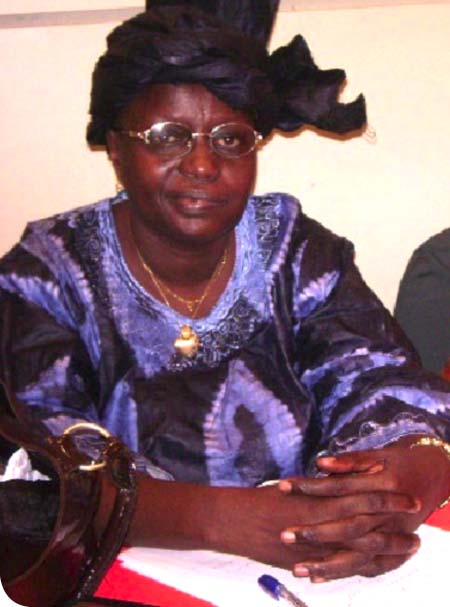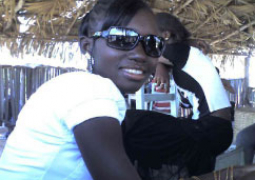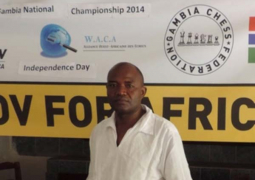
She-she-she had a day with Aunty Amie Sillah at her house in Churchill’s Town, at a time when women all over the world will be celebrating their day on 8 March 2015.
“My inspiration is derived from the fact that I am an activist, a columnist, a trained health officer, an early childhood developer, a woman, a wife, a mother and a grandmother,” she said in her book the “Silent Voices”.
Aunty Amie is more than what she stated in her book, and if you are wondering why, I will say, the 45 minutes interview I had with her made me value myself more as a woman. Her bravery, optimism, the wisdom in her words made me realize that she is not the woman who gives in to defeat in life.
She is an icon, a role model for you and me. The best part of the interview I like most was the fact that Aunty Amie made me laugh all through. I can tell you she may look old to you, but the love she feels for her husband keeps her fresh and young each day.
You want to know more about this fighter, read on:
She-she-she: Hello Aunty Amie, I will like to thank you for giving me the opportunity to have a brief interview with you. Can you please give me a brief background of yourself?
Aunty Amie: My name is Amie Sillah, that is what I use as a journalist, but my husband is Sarr and in my passport, I have Aminatta Sillah-Sarr.
I was a trained public health officer, but the activism gets me into everything including politics. I stood twice in the 1st Republic in Banjul South, but I did not have my deposit because that time it was very difficult for women. We were not known and my women’s rights was not known.
In 2002, I stood again and this time I got my deposit; and if there were reforms I would have been in the parliament because over 2000 people voted for me and, in some constituencies, I had more than them. That is why we want reforms, because if there was reform I will be in the house.
So that is why we women want reform, so that many of us from all the parties will be in the house.
I was also the headmistress for Nyakoi School for 25 years. I trained so many students there, and I am very proud of them because some are now teachers, doctors, and even my own children, one is a computer scientist, the other is an engineer.
I am also a “Family and Women” columnist at Foroyaa since its inception up to now, but I have left the women’s column now because it is too much work for me.
I am now in the “Family” column as a family counselor and mentor, explaining about gender-based violence in the family; how to take care of the family and also the relationship in the family. I am married to my husband for 37 years.
I am also an author, and my first book published, called the “Silent Voices”, is now available at Timbooktoo.
She-she-she: we are celebrating 50 years of nationhood, how is it like being a woman in The Gambia?
Aunty Amie:Being a woman in The Gambia; just as I said, we have our commonality, that is why all of us irrespective of all our differences should help each other.
The rural woman is dead - the drudgery, the excessive childbirth - if you do not have a male child, you are nothing and again too you do not inherit.
In The Gambia, women do not inherit and we should inherit land, according to Islam; but they use tradition to back themselves because, in Islam, the man should have two and the woman one, but they are even denying us our one.
This is true, and there was one story published in Foroyaa, which explained that the lady said their father had only girls. So when he died, the Alkalo seized their land; and they are mining on the land, but they are not receiving a butut from it.
We want the government to implement the international instruments they have signed. Women contribute to most of the food that we eat.
Women in the provinces need farming inputs. At ten years, they look like 20; if you go to the rural areas my age mate looks very old.
The early marriage, excessive childbirth and FGM are all affecting us. Our women with disabilities; we should not forget them, because disability does not mean inability. So let us help them so that they help themselves.
We have seen them in the streets begging. They will be arrested and taken to detention, to court, and we are celebrating 50 years.
We also have many women enterpreneurs who are doing fine, but they are thinking about a market; they need a market internally, the sub region and then the world.
Both the public and private sector should help them to enable them package their commodities to international standards.
When it comes to culture, women are at the forefront, because they hold the families together. Even if you do not give them anything, if you have a programme they will contribute and give you the best.
She-she-she: Aunty Amie, that brings us to the political participation of women in The Gambia. What are your thoughts on that?
Aunty Amie: Women for Democracy and Development, WODD, is the name of my organization, and I mentor young women who are interested in politics so that they can stand. But before you stand, you have to have backing in your community, because you cannot just come out of the blues and say I want to stand.
If you are in your party, then work in your party, go to the grassroots get them, serve them in many ways and let them like you, you like them; and then when you stand, they will vote for you.
We are discouraging woman to woman violence; women should not say that this woman has a child out of wedlock. If the man stands will, they ask that? This is because we had good politicians, and they were never married in Gambian history, and people voted for them.
The media should also take part in publishing their profiles so that people will know them and like them, as well as vote for them.
In my organization, I do not see party; we are all women, if you come to my party platform, yes that is my right.
She-she-she: Sunday 8 March is the International Women’s Day Celebration. I can see the invitation letter from EU on your desk. What do you think of the day?
Aunty Amie: So what they are talking about is women’s leadership; but yes, you can educate women; that is good. However, there must be reforms. We need political reforms, because that is what happened in Rwanda, Senegal, South Africa and all these areas where the quota - one third - will be women and then the rest we will struggle for it.
We need one third in the presidency, parliament, councillorship and everywhere.
What we are asking for on 8 March 2015 is for the Gambia government to make political reforms. We have very good laws, but still now, we do not have a law which is specifically made for FGM, for example.
She-she-she: Aunty Amie you have been married for 37 years now; and nowadays we have seen the cadi courts filled up with divorce problems. I have begun to wonder what is happening to married couples now. Do you not think we have a negotiation tool now?
Aunty Amie: What we lack here is the mentoring of the couples. I have seen that we are not doing it and, in other countries, they are doing it.
Before you married, there is courtship, and they will explain to you that there will be no sex until you get married.
Here, they only talk about the woman; what about the man, because HIV is for everybody.
You will know each other’s behaviour; you know your lives since you are coming from different backgrounds. You will learn to agree and disagree, because you cannot agree all the time.
Materialism is a problem; fathers and mothers because they are poor they sell their children, and if that happens you will die there.
Read Other Articles In Article (Archive)



